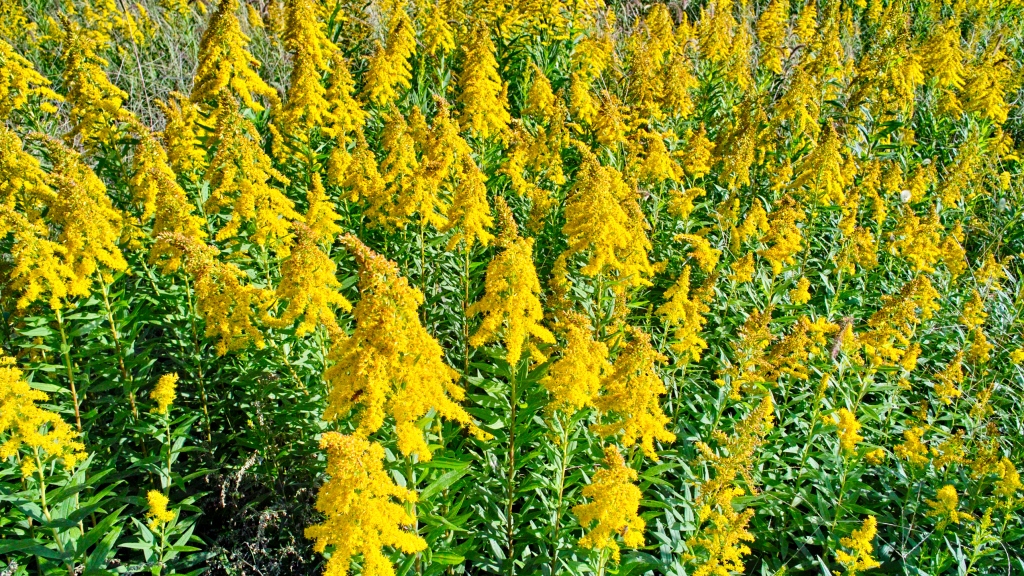Many Mast Cell Activation patients have similar experiences when it comes to this time of year, known affectionately by many as the “Fall Flare.”
What is the Fall Flare? It’s the time of year from around the middle of August to the first frost where the pollens, especially ragweed, are high. Other weeds and molds can also be high. This combination creates triggers for mast cells to activate, which can mean misery for MCAS patients.
Some MCAS patients are able to tolerate a wide variety of foods in their diet until the Fall Flare occurs, and then they’re back to only tolerating a few foods again. So frustrating! Stomach aches return and brain fog. Asthma can flare, and for those of us with EoE (Eosinophilic Esophagitis) coughing and choking can return with a vengeance. Nasal allergies will also become problematic as pollens hit the “high” or “very high” levels.
I’ve found that keeping track of pollen counts is a good way to prepare myself to increase my antihistamine medications (and Chinese herbs) to combat symptoms. The website Pollen.com doesn’t provide exact data for my area. Instead it is an “average” pollen count from past years, which can be wildly inaccurate especially if there is rain or wind. Better than this website, I like to follow a local allergist’s pollen count on their website because pollens will dip and surge depending upon the daily weather. Rain can calm down the pollen counts, while wind can make a “moderate” pollen count seem much higher.
Fall isn’t the only time that pollens can exacerbate MCAS symptoms. In the Spring, trees are usually the highest pollen producer. Grasses start in the early summer months, and can remain high throughout the summer depending upon your location. And for those with indoor allergies, it can be a year round adventure.
As a child, living in Colorado, I had allergies to grasses, trees, weeds and molds. My allergies would amp up in April when the trees would bud and remain until that wonderful first freeze that used to occur by the end of September. We always got our first snow by the first of October. Our weather has become so much warmer, and allergy season has now extended from March through October. This year, we had days in June that topped 90 degrees, and many days into the end of September with that same hot temperature. That is unprecedented, and my symptoms of gut aches were much worse this year than they have been in previous years.
Through the “magic” of Dr. Li’s Traditional Chinese Medicine, I rarely have nasal allergies anymore. However, with this year’s Fall Flare I began having stomach aches in mid-August with the start of ragweed pollen. These have continued until now on and off. We’ve had only a few rains over the last 2 months, which would really help to tamp down my symptoms.
Short of being able to change the weather, what can you do as a MCAS (Mast Cell Activation Syndrome) patient to calm your symptoms at this difficult time of year?
- Keep a diary of your symptoms to see if there is a pattern with the weather, or with your exposure to fragrances or food. Getting rid of triggers goes a long way toward feeling better and more stable.
- Pollens are a stressor to your body and mind, equal to the stress of working too long of hours or of not getting enough sleep. Give yourself a little extra care, and try to not take on too many activities outdoors when the pollens are high.
- You might want to consider wearing a mask if you need to be outside. I’ve found that to help keep my symptoms at bay.
- If you don’t have an air purifier, you might consider getting one. Additionally, air conditioning helps to not only cool the air (since many MCAS patients react to heat) but also to filter out pollens especially if you use HEPA filters. They’re more expensive, but I’ve found they are worth every penny!
- Keep your windows closed during high pollen season, and keep your pets out of your room if they also go outside frequently. They are bringing in pollens to your home.
- Make sure to speak with your doctor about your symptoms, especially if you are feeling unable to complete your regular tasks. There is likely something that can be done to mitigate your symptoms and get you back to life!
- Remember that the Fall Flare doesn’t last forever. Taking it one day at a time, and maybe even one minute at a time will make it more manageable.
